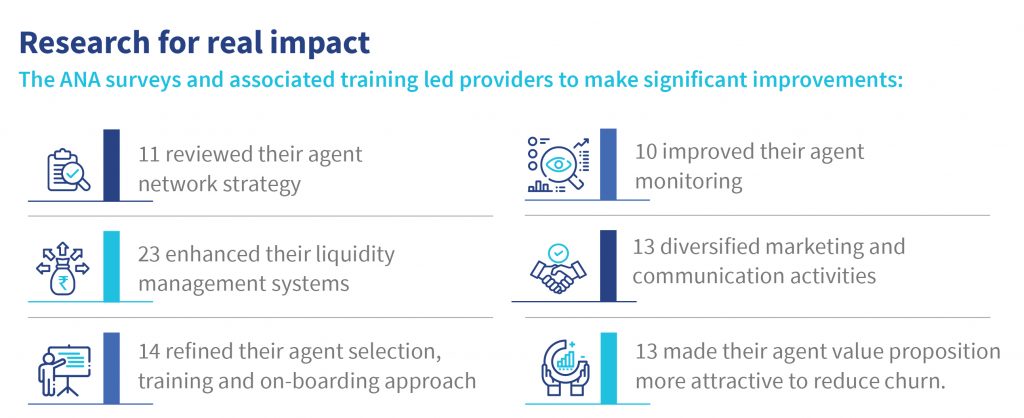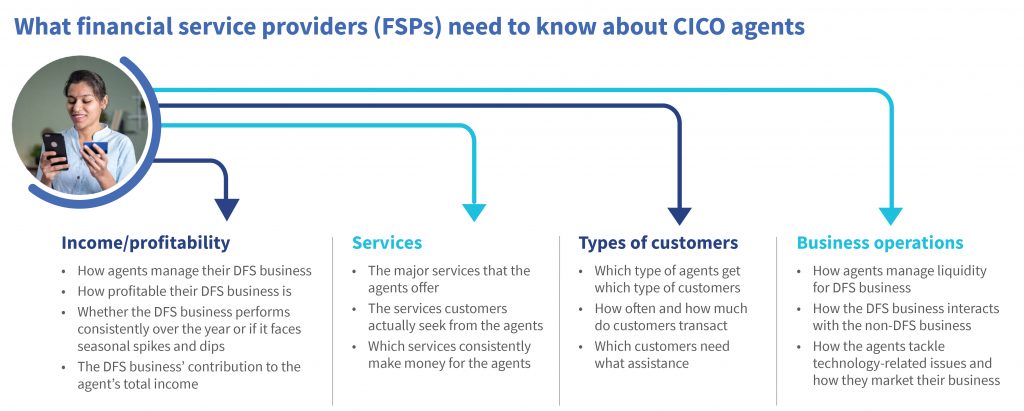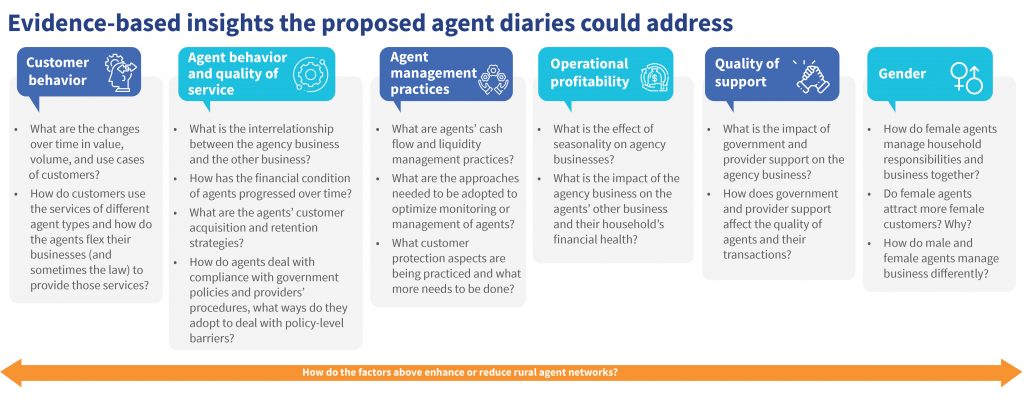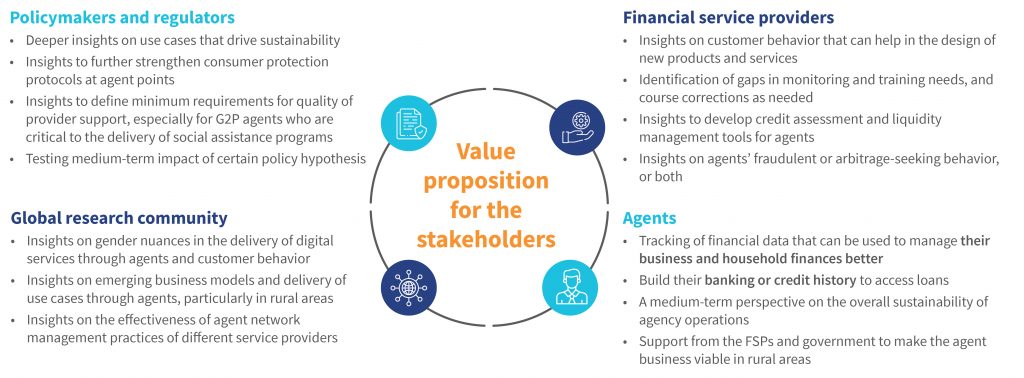Daily diaries: Reimagining how we generate insights to optimize cash-in, cash-out (CICO) agents
by Rahul Chatterjee
 Aug 18, 2023
Aug 18, 20236 min
The blog discusses the Agent Diaries approach, a research method that tracks the financial transactions of different types of CICO agents over time. It highlights the data gaps, challenges, and insights related to the agency business. It also compares the traditional and technology-driven ways of data collection and their cost-effectiveness.
Anant runs a cash-in cash-out (CICO) agency business in a rural part of Bihar state in eastern India. He works for one of the country’s largest nationalized banks. Unlike many CICO agents, Anant has no side business—the agency business is his only source of income. On the other hand, Yusuf from Bogor, Indonesia, runs his CICO agency alongside a mobile accessories business. Yusuf’s agency business accounts for around one-fifth of his total revenue. Ira is a FinTech agent from the same locality as Yusuf. She runs her agency business alongside a laundry shop, but it yields negligible income.
Anant, Yusuf, and Ira are among the estimated 18.4 million[1] CICO agents worldwide. Alongside traditional banking agents, the CICO community now has new-age agents, such as FinTech agents in Indonesia, mobile financial services (MFS) agents in Kenya and Bangladesh, and electronic money issuer (EMI) agents in Côte d’Ivoire and Senegal.
Yet how much do we really know about CICO agents? What do we know about their challenges and the support they need? MSC’s Agent Network Accelerator (ANA) program, which ran from 2013 to 2018, was designed precisely for this purpose—to increase the global understanding of ways to build and manage sustainable agent networks and identify factors that drive their success or failure. The multi-year research program covered 31,500 agents across 14 countries in Asia and Africa.
We have little nuanced data on the agents’ rapidly changing landscape worldwide.
A lot has happened since the closure of the ANA project. The COVID-19 pandemic changed the world permanently, and a new set of agents have emerged. Markets dominated by MFS agents have seen the entry and growth of banking agents, whereas markets dominated by banking agents have seen the entry of new-age agents. Data from the supply side that compares different agent types is absent, as are industry benchmarks for their performance, network size, and agent management practices, among other factors.
However, a deeper knowledge gap persists. Financial service providers need to understand the following if they wish to help CICO agents:
And all of the knowledge gaps outlined above need to be explored for each agent type so we can understand the needs and behavior of each type and design solutions accordingly.
A nuanced and lean approach for continual agent network assessment
Traditional surveys that provide a snapshot of the situation fail to capture the dynamic and volatile nature of the agency business’s economics, primarily in terms of its evolution over time and the effects of seasonality. Aspects related to the management of agency business relative to the core business of the agents (for non-dedicated agents) are often overlooked, even though these have huge implications on the overall agent sustainability. And, of course, running large-scale surveys on agents over time is a resource-intensive exercise.
However, we can make optimal choices on cost and time with the right data collection strategy that involves technology, instrument, and agent sampling, among other aspects, alongside study outputs and outcomes. These choices would optimize the duration of data collection and how quickly data is made available for review, among other aspects.
We can uncover critical insights if we use the Financial Diaries method to track the financial transactions of different types of agents over time—banking vs. FinTech vs. MFS, male vs. female. These insights would include: (i) the differences among the various types of agents; (ii) how the DFS business and other non-DFS businesses interact for non-dedicated agents; (iii) how they cope with the dynamic nature of the business; (iv) the challenges they face; and (v) the supervision and support they receive. These insights captured over time give a sense of how seasonality affects these aspects of the business.
This diaries approach is a nuanced research tool that can bridge all the data gaps if we have a suitable sample of different agent types. Traditional diaries research is resource-heavy, but a technology-driven approach, where diarists enter their daily data through an app, can reduce costs. It saves money by reducing the number of field researchers needed for data collection.
In MSC’s technology-driven Agent Diaries approach, the role of field researchers is limited to handholding and quality control since the diarists themselves upload the data. The data upload is almost real-time, as the diarists upload data daily. Thus it gives the research team more time to check data quality and make course corrections through re-training in the early phase of the research.
What have we learned from the Agent Diaries pilots in Indonesia and India?
MSC piloted the Agent Diaries approach with a small sample of agents in Indonesia and India. In Indonesia, we ran the research for 18 weeks with eight CICO agents—three Laku Pandai banking agents, two G2P banking agents, and three FinTech agents. The research pilot highlighted how the use cases and volume of transactions varied across agent types, how volatile the income of different agent types was, and the association between agents’ gender and the clients’ gender division. The data also indicated the trends are consistent over time. The insights helped us derive specific recommendations for service providers and regulators to manage volatility and utilize female agents more effectively.
In India, we focused the pilot on BC Sakhis—female CICO banking agents—members of self-help groups. We ran the research pilot with six CICO agents, comprising five BC Sakhis and one male banking agent. The research highlighted the differences in the income of male and female agents, pointed out the lack of use cases, and highlighted recommendations for service providers.
In India, we used a traditional approach of paper-based data collection by the agents and subsequent digitization of that data by field researchers. However, in Indonesia, we used a technology-driven lean approach. MSC’s DatIn app was specifically designed for data collection in diaries research. As agents are tech-savvy and digitally literate, they handled the Android application with ease.
We used this technological capability by asking the agents to enter their daily financial data on the DatIn app. After initial training and a few days of support, the data collection exercise became smooth, and the field researcher’s role was mostly limited to quality checks.
We are currently developing a feature in the DatIn app so that the diarists can see their income and expenses data in a graphical form in the app itself to understand how their business is doing. This feature will incentivize the agents to use the app to enter their daily data.
In our experience, a field researcher in a large-scale diaries research can handle around 25 diarists comfortably if they visit each diarist once in 15 days. However, if diarists do self-entry of data then the field researcher’s role becomes limited to handholding and data quality assurance. The majority of the handholding work can be done virtually as well. As the field researcher would not have to do any data entry work, they can cover around 50% more diarists on a given day, assuming the diarists are not widely scattered. Hence, we can cut the data collection cost by half using technology than a traditional diaries data collection approach.
To conclude
The Agent Diaries research approach can unpack nuances and also be implemented in a resource-optimized way. Multi-country, multi-year research using the Agent Diaries approach can prove crucial to help the new agent types to grow. And each stakeholder—regulators, financial service providers, agent network managers, and the agents themselves—will benefit from it. See more of our work on Agent Diaries and related research here and here.
[1] MSC estimates
 by
by  6 min
6 min 




Leave comments